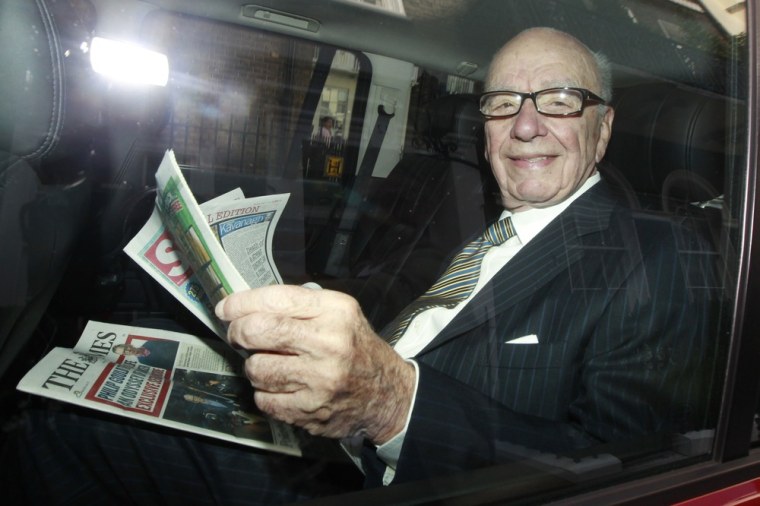A final decision on Rupert Murdoch's biggest takeover battle has been delayed for several months after the British government referred News Corp.'s bid for British Sky Broadcasting PLC to competition authorities, as a phone hacking scandal showed no sign of abating.
The announcement Monday from Culture Secretary Jeremy Hunt followed News Corp.'s withdrawal of a promise to spin off Sky News, which had been a condition for buying the 61 percent of the satellite broadcaster that it doesn't already own.
Britain's Competition Commission now must hold a full-scale inquiry into whether the takeover would break anti-monopoly laws. These inquiries usually take six months and Murdoch must be hoping that the current febrile atmosphere surrounding the bid cools down.
"I think it is a smart move, it allows politicians some wiggle room, it takes all the political pressure off," Louise Cooper, media analyst at BGC Partners said. She added that Murdoch had done the government a favor by forcing a competition inquiry — a favor which the media mogul will hope to redeem in the future.
News Corp.'s second dramatic move following last week's decision to close the News of the World, the tabloid newspaper at the heart of the phone hacking scandal, came as the government was facing intense pressure to block the bid from all sides of the political spectrum. New allegations in the hacking scandal emerged Monday, including a BBC report that said the Sunday Times, a newspaper owned by Murdoch's News International arm, allegedly targeted the personal information of former Prime Minister Gordon Brown at the time he was Britain’s finance minister.
Deputy Prime Minister Nick Clegg urged Murdoch to "do the decent and sensible thing" and reconsider the bid for BSkyB, while Ed Miliband, the leader of the opposition Labour Party, has threatened a Parliamentary vote on the bid.
Murdoch arrived in London Sunday to personally manage the crisis enveloping his media empire, which has seen the share prices of both News Corp. and BSkyB take a battering over the past few days.
BSkyB shares closed down 4.6 percent at 716 pence ($11.40) on the London Stock Exchange Monday, rebounding from earlier lows. Just a week ago, BSkyB's shares were trading as high as 850 pence, meaning the company has shed around 17 percent of its value, or around 2.3 billion pounds ($3.7 billion).
By midday New York time, News Corp. shares were down 6.8 percent at $16.16, meaning it has lost around $3 billion worth of its value on Monday alone.
Murdoch has a history of getting out of tight situations in Britain, ever since he took control of the News of the World back in 1969. He clearly hopes that taking the proposed takeover out of the political arena may help him get full control of BSkyB.
"News Corp. continues to believe that, taking into account the only relevant legal test, its proposed acquisition will not lead to there being insufficient plurality in news provision in the U.K.," the company said.
A failure to clinch the 7.5 billion pound ($11.9 billion) takeover would be a huge setback for Murdoch, who has built up a global media empire over four decades. The company owns Fox News and the 20th Century Fox film studio, and a raft of newspapers and media outlets all round the world.
As well as being News Corp.'s biggest ever acquisition, full control of BSkyB would have given News Corp. 100 percent of what has become an increasingly profitable enterprise. In the last financial year, BSkyB made a pretax profit of a little under 900 million pounds ($1.43 billion) through its offering of exclusive sports rights and blockbuster movies.
Just a week ago, it looked like the British government was going to wave the deal through, subject to certain conditions, including spinning off the Sky News network. One of the major worries among Murdoch critics was that his stable of news outlets would have too much power over the British media.
Earlier in the day, Prime Minister David Cameron said News Corp. needed to resolve the difficulties in its U.K. unit, News International, over the phone-hacking scandal before pressing ahead with the BSkyB bid.
"If I was running this company, BSkyB and News Corp., I would be focused on clearing up the mess that there is in News International, with all the problems that are still coming out," Cameron said following a speech in London. "I suspect there are more problems to come out."
Cameron himself is under pressure too for his close ties to key figures in the scandal, including former News of the World editors, Andy Coulson and Rebekah Brooks.
Coulson has been arrested, while Brooks continues to face mounting pressure to step down from her job as chief executive of News International.
Brooks and several executives have offered to be interviewed by police as witnesses, a source at News International confirmed, speaking on condition of anonymity.
Murdoch may face troubles in the United States as a result of the phone hacking scandal. Legal experts said Monday it is possible Murdoch's U.S. companies may face legal actions because of the shady practices at the News of the World, his now defunct British tabloid.
They said Murdoch's News Corp. might be liable to criminal prosecution under the 1977 Corrupt Foreign Practices Act, a broad act designed to prosecute executives who bribe foreign officials in exchange for large contracts.
The News of the World was accused of making payoffs to police in exchange for information — a possible violation of the anti-bribery provisions of the act. It would be up to the U.S. Department of Justice to decide if this merited criminal charges, while the Securities and Exchange Commission would determine if there had been financial wrongdoing at News Corp.
